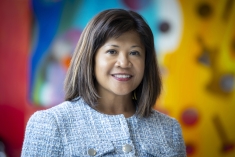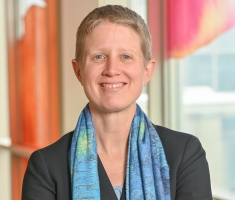Rutgers Law Professors Among Top 100 Legal Scholars
Rutgers Law School Professors Rose Cuison-Villazor and Katie Eyer were recently named to the Top 100 Legal Scholars of 2024 list. This distinction is the result of a unique study by researchers at George Mason University, which ranks scholars based on their recent, influential law review articles rather than lifetime contributions. According to the study’s authors, “This approach allows for the recognition of a broader range of scholars who have produced influential work.” Notably, Rutgers Law School outperformed its US News & World Report ranking with two scholars—both women—earning spots in the top 100.

Professor of Law Rose Cuison-Villazor is Rutgers Law School’s Chancellor’s Social Justice Scholar and serves as director of the Center for Immigrant Justice. She previously served as vice dean (2019-2021) and interim co-dean (2021-2023), becoming the first Filipina American dean of a U.S. law school. Her research explores how laws, policies, and societal norms influence community inclusion and exclusion, particularly in immigration and citizenship law, property law, and race and the law. Her scholarship has appeared in top law journals such as California Law Review, Columbia Law Review, Harvard Law Review Forum, Michigan Law Review, and New York University Law Review.
Cuison-Villazor is co-editor of three casebooks, including Immigration and Citizenship: Process and Policy (10th Ed.) (forthcoming 2026); Integrating Spaces: Property Law and Social Identity (2nd Ed.) (2023); and Race and Races: Cases and Resources for a Diverse America (4th Ed.) (2022). She is currently working on two books: a monograph entitled Forbidden Love: Race, Citizenship, and the American Family (forthcoming 2027) and a co-written book, AsianCrit at the Intersections (with Robert Chang) (forthcoming 2027)
“I am deeply honored to be included on this list along with my colleague and friend, Katie Eyer,” says Cuison-Villazor. “My scholarship delves into how laws and policies shape our understanding of who belongs—questions that are more urgent and relevant than ever in today's world. As a first-generation lawyer and an immigrant, my perspective is informed not only by legal definitions of membership, but also by the ways these laws intersect with race, gender, class, and other critical factors. I am truly grateful that my work is making a meaningful impact.”

Professor of Law Katie Eyer is an anti-discrimination law teacher, scholar, and litigator, and a leading expert in LGBTQ employment rights, social movements, and constitutional change. Her 2019 article, Statutory Originalism and LGBT Rights, is widely credited with originating the textualist argument that the Supreme Court adopted in the 2020 case Bostock v. Clayton County, the landmark decision that recognized anti-LGBTQ discrimination as a form of sex-based discrimination under Title VII. Her scholarship has been published in top law journals such as Yale Law Journal, University of Pennsylvania Law Review, Virginia Law Review, Vanderbilt Law Review, Harvard Civil Rights-Civil Liberties Law Review, and others.
Before joining the Rutgers Law faculty, Eyer was a leading LGBTQ employment rights litigator. In 2005, she founded the Employment Rights Project at Equality Advocates Pennsylvania, one of the nation’s first initiatives dedicated to protecting the employment rights of LGBTQ workers. Her litigation resulted in several precedent-setting decisions that expanded protections for LGBTQ and disabled workers, including one of the first appellate rulings in the country allowing a gay plaintiff's Title VII claims to proceed to trial.
“It is such an honor to be recognized as one of the Top 100 Legal Scholars of 2024, and I am especially honored to be recognized alongside my esteemed colleague Rose Cuison-Villazor,” says Eyer. “I was raised most of my childhood by my mother as a single parent: a woman who was herself an academic trailblazer, as the first woman to be tenured in the biology department at Penn. I hope to be a mentor and role model for other women entering academia and the legal profession just as she was to me.”